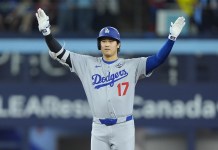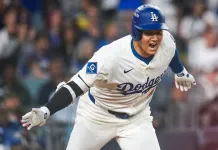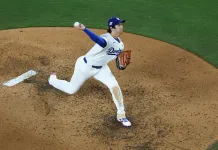Minnesota Twins vs. Houston Astros ALDS Preview
Nearly 20 years worth of frustration melted away for the Twins as they celebrated their Wild Card Round win over the Blue Jays. Toronto scored exactly one run in the series and the Twins only scored five, but it was enough to move on. Truth be told, this might be the most interesting series of the second round because there are so many areas that cancel out in some way between the two teams. More on that shortly.
With the very obese monkey off of their backs, the Twins are surely hungry for more, but it kind of feels a little bit like playing with house money now. They’ve gotten over one big hump and anything that happens beyond that feels like a bonus. On the other hand, this is about the most vulnerable that the Astros have felt in quite some time. After all, they won only one more game than the Blue Jays and nine fewer games than the Rays, who are now on the golf course or the beach.
For the Astros, the stress and pressure of the postseason is nothing new. They’ve made the playoffs every season since 2017 and have been to the World Series four times, going 2-2. For the Twins, it’s all new from this point forward, so we’ll see if that has any impact in this best-of-five showdown.
MLB Odds | MLB Betting Splits | MLB Matchups
MLB Playoffs Odds from DraftKings Sportsbook
Twins +135 / Astros -160
Twins vs. Astros schedule and how to watch
Game 1 (@ HOU): Saturday October 7, 4:45 p.m. ET (FS1)
Game 2 (@ HOU): Sunday October 8, 8 p.m. ET (FS1)
Game 3 (@ MIN): Tuesday October 10, 4 p.m. ET (FOX)
Game 4 (@ MIN): Wednesday October 11, TBD (FOX/FS1) (if necessary)
Game 5 (@ HOU): Friday October 13, TBD (FOX/FS1) (if necessary)
Pitching Matchups
(based on announcements and my guesses)
Game 1: Bailey Ober vs. Justin Verlander
Game 2: Pablo Lopez vs. Framber Valdez
Game 3: Cristian Javier vs. Sonny Gray
Game 4: J.P. France vs. Joe Ryan
Game 5: Pablo Lopez vs. Justin Verlander
With two off days in the mix, rotations could be manipulated for pitchers to go on shorter rest. Perhaps that happens here, especially on the Houston side, where they have more starting pitcher depth concerns than the Twins. I think Minnesota would be comfortable with an Ober start, especially as a fly ball guy with likely cooler weather in mid-October.
Twins vs. Astros series preview
Much like what we just saw with Toronto, the Astros have a very right-handed-heavy lineup, but their two primary lefties – Yordan Alvarez and Kyle Tucker – are premier hitters. The Blue Jays didn’t have that. Against a right-handed-heavy pitching staff like Minnesota’s, one that led the league in pitching strikeouts, by the way, we could see another suppressed run environment.
The Astros have been one of the best teams at strikeout avoidance over the last few seasons and the Twins led the league in strikeouts. I figured that would be more of a factor in the Wild Card Round, though it was to some degree. The Twins were 3-for-29 with 11 strikeouts in Game 1 outside of Royce Lewis’s two home runs and scored a run on a single and a double play while going 7-for-29 with 10 strikeouts in Game 2.
The Astros used to fill up the K column with guys like Gerrit Cole, Verlander, Lance McCullers Jr., and some of the other arms that have now departed, fallen to injury, or just aren’t quite as effective anymore. In the Statcast era (dates back to 2015), this Astros pitching staff ranks sixth in K% at 23.9%. While that’s still well above league average, last year’s group posted a 26% K%. The 2019 version was at 27.9%. The 2018 version leads the way at 28.5%. The strikeout is still something of a weapon for Houston, but not to the degree that it once was. That being said, Minnesota will give them the opportunity to post a higher number than the season average.
Offensively, these two teams were pretty close. In the second half, the Astros posted a 127 wRC+ and the Twins hung a 124 wRC+. Minnesota was third behind the Braves and Phillies in homers, but the Astros were right there in fourth. The big difference? Minnesota struck out 26.4% of the time and Houston struck out 18.9% of the time. However, that being said, the two teams posted nearly identical wRC+ marks even though the Twins failed to put a ball in play 7.5% more often than the Astros.
What I find fascinating about this series is how Minnesota’s strikeout prowess comes from the rotation and Houston’s comes more from the bullpen, which is the more traditional route to take. The Twins ranked third behind Tampa Bay and Milwaukee in SP K% in the second half at 26%. Houston, meanwhile, ranked 20th at 21.9%. Hunter Brown led the team and I don’t think he’ll get a start in this series after posting a 6.90 ERA with a 6.05 FIP. Javier is second and he had a 4.84 ERA with a 5.02 FIP. Valdez was third and he had a 4.66 ERA with a 4.39 FIP, as he threw a no-hitter and seven no-hit innings, but wasn’t great otherwise. Verlander’s K% only sat 22.3%, basically around league average.
Houston’s bullpen, while hugely effective in the second half, also had a lower K% than Minnesota’s. But, again the Astros strike out at a much lower rate. It makes this series very challenging to handicap. If the Twins can put more balls in play than their numbers suggest, they’ll have a great chance at pulling off an upset. On the flip side, you’re not scoring runs with a lot of strikeouts, as seen during the Wild Card Round. Minnesota had very few scoring chances against the Blue Jays, but only gave up one run. Houston’s offense may not get held down like that.
It would have altered the price, but if it wasn’t Joe Ryan in Game 1 and it was able to be somebody like Lopez and the odds were still listed at +135, I probably would have advocated for a Minnesota pre-series position. But, Ryan is a guy that can give up homers and he’s less trustworthy to me than Lopez and Gray.
It is worth pointing out that Valdez has struggled and the Twins posted a .364 wOBA and a 135 wRC+ against lefties from August 1 through the end of the regular season. Still, Houston was a top-five offense against righties once everybody got healthy.
I think there is a decent chance that this ends up going five games, so Over 4.5 Games at +155 is something I’ve looked at pretty hard.
It doesn’t correlate well to thinking that it could be a long series, but Under 34.5 Total Runs at -105 is something that caught my eye as well. The Astros scored 97 more runs on the road than they did at home (4.5 R/G vs. 5.7 R/G) and it should cool down at Target Field. We didn’t see much fly ball carry in this past series. If I’m wrong about a long series, this bet has a great chance.
I’ve still got a little over a day to decide, but for now, I won’t have a pre-series bet.
Catch VSiN Daily Baseball Bets and also see Adam Burke’s daily MLB best bets and picks every day throughout the MLB Playoffs.





